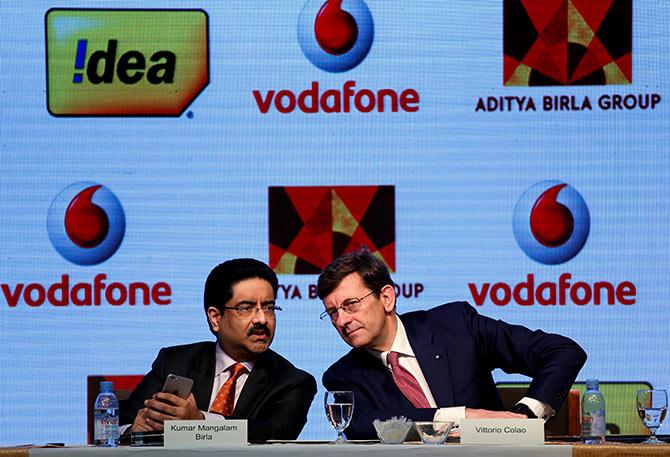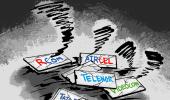'The government is unwilling or unable to provide the kind of relief that Vodafone India is asking for.'

"Currently, about 30-odd per cent of the revenues of telecom companies go to the government. This is unhealthy. The situation will improve if more money can go into the network (upgradation). The telecom companies can take care of the rest (of the other challenges facing telecom markets)," says Mahesh Uppal, director, Com First India, a consulting firm.
India's operational telecom companies confront an uphill task, no doubt.
As Vodafone Idea and Bharti Airtel scramble their resources to comply with the Supreme Court order on adjusted gross revenue (AGR) dues, leaders from these companies have had meetings with Telecom Secretary Anshu Prakash and Telecom Minister Ravi Shankar Prasad in an attempt to find a way out of the tangle that operational and non-operational telecom companies find themselves in on account of payment of license fees, interest and penalty on the same and payment of spectrum usage charges (SUC) that adds up to roughly 1.47 lakh crore.
This includes Rs 22,589 crore in unpaid license fees, which along with interest and penalty has touched Rs 92,641 crore as of June 2019.
Add to this, the burden of payment of Rs 55,054 crore as SUC, and one can understand the task before companies like Vodafone Idea and Bharti Airtel.
As per reports while Bharti Airtel has already paid up Rs 10,000 crore on account of license fees and SUC, Vodafone Idea too has made a payment of Rs 3,500 to the government.
The meeting of Bharti Airtel's Sunil Bharti Mittal with Minister Prasad on February 20 and that of Vodafone Idea Chairman Kumar Mangalam Birla with Telecom Secretary Prakash two days earlier are looked upon as efforts to find a solution to the vexing issues faced by these telecom operators.
Uppal believes that Vodafone Idea might fold up, based on the comments made by the company itself, but says the government tweaking its telecom policy could offer a ray of hope to the beleaguered companies.
In an interview with Prasanna D Zore/Rediff.com, Uppal discusses the impact of telecom duopoly in Indian markets and how it could affect the government's ambitious 5G rollout programme.
What are the challenges before the weak players in the telecom sector like Vodafone Idea and the government-owned BSNL and MTNL?
In the case of Vodafone Idea the challenge is essentially financial. In the case of BSNL and MTNL, the issues is also of quality of service besides financial weakness. The companies have consistently lost market share.
In case of Vodafone, there is no serious issue as there is no huge difference between its service offerings and that of its competitors (Jio and Airtel). It is as well placed as Jio and Airtel.
But BSNL has been struggling for quite some time as it has not been able to drive subscriber numbers partly because people had a major issue with the quality of its services and reliability.
Is the Vodafone Idea management capable enough to overcome financial issues, including the AGR payment to the government?
They themselves have said several times that they are not. They have said that unless the government steps in they would be unable to continue their telecom business. We don't know what will happen eventually, but that is their (Vodafone Idea's) own assessment.
Given you experience as a telecom analyst, could you comment on what are the chances that Vodafone Idea would fold up?
Based on what the company has been saying, I think the chances are high. Given the limited options that the government has (in offering a rescue package; The Economic Times has reported that the government is mulling the option of deferring Vodafone Idea's non-AGR dues), the chances (that Vodafone Idea could fold up) are quite high.
Of course, the government has an option to renegotiate (the terms of repayment of Adjusted Gross Revenue, Spectrum Usage Charges and license fees) if the Supreme Court does not object; (the government) has an option to change policy.
Now, whether it will do it or not doesn't matter but by most accounts, the government is unwilling or unable to provide the kind of relief that the company is asking for.
Will Mr Kumarmangalam Birla's meeting with Telecom Secretary Anshu Prakash help in any way in at least postponing the eventual fall?
Well, that meeting is already done. Mr Kumarmangalam Birla is the best person to answer this question. But the government has very limited options given the fact that fiscal challenges (facing the government) are quite serious.
(Bharti Airtel's Sunil Mittal met Telecom Minister Ravi Shankar Prasad on February 20 and said the government is focusing on dealing with the AGR tangle. Mr Birla's meeting with the telecom secretary happened on February 18.)
If at all Vodafone Idea folds up, what could be the consequences on the telecom industry, the government as well as consumers?
It will be bad news all around. It will be bad for all the stakeholders. The government certainly will lose all the dues (from Vodafone Idea) that are still pending.
The industry will lose its competitiveness and we lose an important player in the market. Consumers, who certainly rely on competition for better prices and better quality of services, will also suffer as the competition reduces in the market.
If Vodafone Idea indeed folds up, who among the incumbents Jio and Airtel will have an upper hand in taking advantage of the situation?
Both of them will benefit from this as the stock market tends to indicate (Bharti Airtel shares have been witnessing a strong interest in recent times).
Reduced competition is obviously not unwelcome if you are a secure player in the market.
What role could the Government of India or the telecoms regulator, TRAI, play to prevent India's telecom industry from becoming a duopoly?
The current approach of charging levies based on revenue sharing needs to go. It offers the wrong incentives.
An inefficient company will pay less (levies as part of their annual revenues). This is not very smart.
If we want to avoid having a telecom duopoly we need to reduce the costs (of doing the telecom business).
We have to reduce the payments that the telecom companies need to pay to the government.
The government has to see that more money goes into building networks, not to itself.
Currently, about 30-odd per cent of the revenues of telecom companies go to the government. This is unhealthy. The situation will improve if more money can go into network (upgradation). The telecom companies can take care of the rest (of the other challenges facing telecom markets).
Markets are what they are. Some players will succeed, others will fail.
We don't want regulators adding to the costs and the financial burden of telecom companies.
How well will the current telecom industry situation augur for the government's ambitious 5G rollout programme?
It is very worrying. This situation does not augur well for the 5G rollout or for the government's revenues.
If the auction of 5G spectrum does not succeed or receives a weak response, then government revenues will again suffer.
If only two strong incumbents exist in the industry, could they game the system?
Probably. Also to be fair (to the government) the auction is not closed to outsiders (foreign companies). The auction (of 5G) spectrum is open to more players.
What could be the policy measures that the government could undertake or tweak existing policy measures so that we could once again have a thriving telecom industry in India?
This whole approach of basing telecom levies on operator revenues is a very bad idea. That should go.
Second, levies themselves take away very precious investments away from infrastructure. Levies should be lowered to near zero.
If the government's fear is that companies will start making huge sums of money at the cost of the exchequer, it can adjust taxes in the annual budget (to address this concern).
The AGR is akin to a telecom tax.
Any changes in the spectrum usage charges, or license fees the telecom companies pay to the government that could help revive the industry?
Levies include spectrum usage charges. There is no justification for continuing with a separate SUC if the spectrum is sold in an open auction.












 © 2025
© 2025